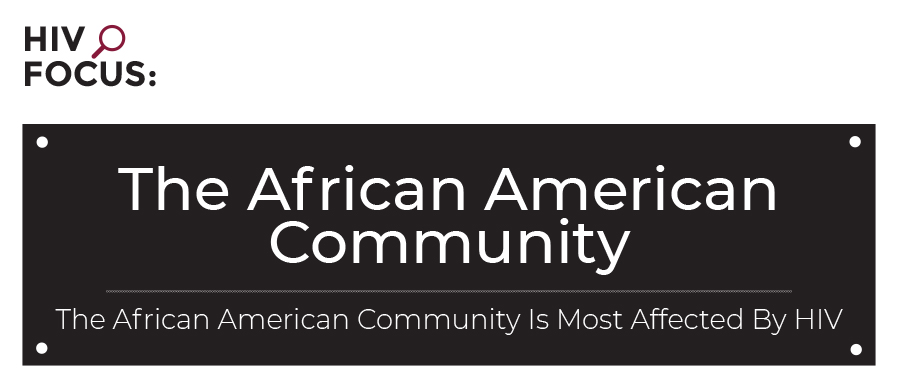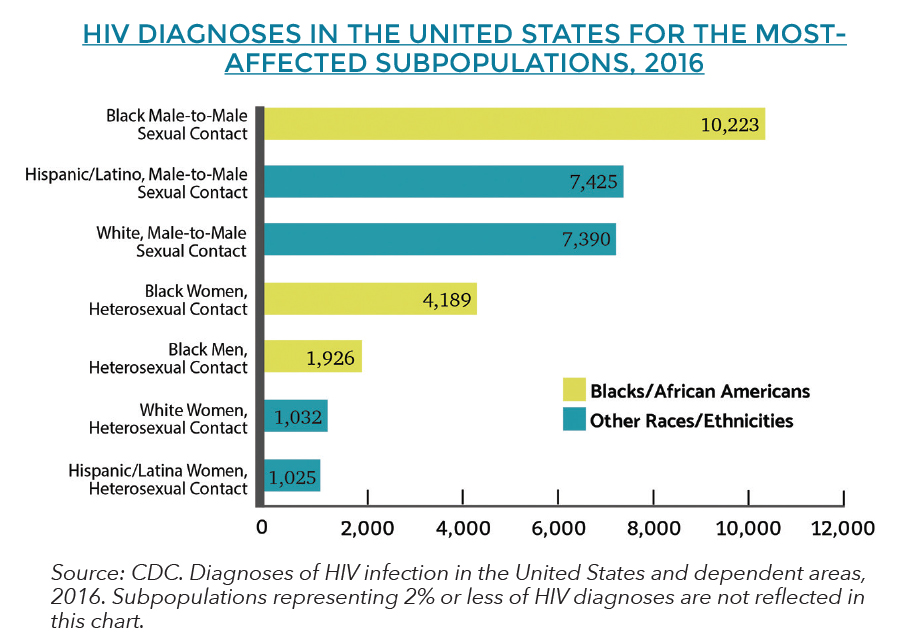HOME
PAST DIGITAL ISSUES
HIV/AIDS HOTLINES
HIV 101
POSITIVE PROFILES
ASO SPOTLIGHT
ARCHIVED ARTICLES
HOW TO PAY FOR HIV TREATMENT AND MEDICATIONS
ADAP CRITERIA AND FORMULARIES
ASO LISTINGS
REVIEW OF HIV MEDICATIONS
2018 HIV/AIDS FUNDRAISING ACTIVITIES & EVENTS
ABOUT HIV POSITIVE! MAGAZINE
LINKS
SUBSCRIBE
CONTACT US
ADVERTISER INFORMATION
The African American Community

HIV disproportionately affects African-Americans more than any other racial or ethnic group in the United States. Representing about 12% of the U.S. population, African-Americans now make up almost half of the total reported HIV cases in the country according to the Centers for Disease Control and Prevention (CDC) since the initial reporting of HIV began.
Although there has been a recent drop in HIV diagnoses across every population group in the United States, African-Americans are significantly more likely to contract the disease. At the end of 2014, 471,500 African-Americans were living with HIV which encompasses 43% of everyone living with HIV in the U.S.. In 2016, African-Americans represented 44% (17,528) of newly diagnosed infections. Among that group, more than half (58%, 10,223) of African-Americans diagnosed with HIV were men that have sex with men (MSM).
Of the total population of women living with diagnosed HIV at the end of 2014, 60% (139,058) were African-American. During the time period from 2005 to 2014, new HIV diagnoses among African-American women fell 42% but are still significantly higher compared to other races and ethnicities
The disproportion is not just prominent among adults but affects infants and children as well. In 2016, 64 (65%) of the estimated 99 infants perinatally (surrounding the time of birth) infected with HIV were African-American. Of the 38 US children younger than 13 who received new AIDS diagnoses, 25 (66%) were AfricanAmerican indicating that African-American children are three times (.3 per 100,000 children) more likely to be diagnosed with AIDS than the total population (.1 per 100,000 children).

So why does HIV strike the African American community so disproportionately? The Centers for Disease Control and Prevention (CDC) theorizes the following:
Awareness of HIV status and late diagnosis.
Individuals that are unaware of their HIV status or are diagnosed late or later while having the disease can unknowingly spread the disease among the community. A 2010 study conducted by the CDC found that almost 85,000 people infected with HIV in the African American community were unaware of their HIV status.
Prevalence within the community.
Starting out with a high percentage of community members with HIV increases the probability of infection to others. People of the same race/ethnicity, in this case African American, tend to have sex with the same race and ethnicity so that increases the risk of infection with a new sex partner.
Socioeconomic contributing factors.
Lower socioeconomic status, which is prevalent in some African American communities, can have a negative effect on education and access to adequate healthcare. Lack of insurance and ability to pay for care and treatment can impede everything from initial diagnosis through long term continuing care.
Discrimination and stigma.
While stigma and fear of HIV and the diagnosis of being HIV positive may not be any more prevalent than in other races and ethnicities, it still exists and is no less either. Also, members of the African American community are no stranger to discrimination of all types. This is a major challenge to early diagnosis, acknowledgement and treatment.
Injected drug usage.
According to a 2011 CDC Surveillance Report, injected drug use counts for more HIV infections among African Americans than any other ethnic group. It's also the third most likely route to HIV transmission. Injected drug use can directly transmit through the sharing of needles and secondarily or indirectly be transmitted through being sexually involved with an IV drug user.
You Can Help
So what can you do for your part to help the problem? If you are African American and HIV-positive or at risk, what you need to do to help protect yourself or others from contracting the HIV virus isn't different from other races or ethnicities. Things like practicing safe sex with your partner, Using PrEP, not using a dirty or shared needle if you are a drug user, getting tested and knowing your partner's status are all essential.
What is different though, because you live in a community that has such a high incidence of HIV, is the level of awareness that you need to have.
For starters, your awareness needs to begin with you. If you are HIV-positive, let your partner(s) know. If you haven't been tested and think you might be at risk - no question - get tested. If you have a partner, get tested with him or her. Doing that gives you peace of mind of your partner's status too.
Educate not only yourself but close friends and family members who might not be as careful and knowledgeable as you and may also be at a higher risk.
Getting tested and being educated can help stop the spread of HIV to you and can also mean you not spreading it to others.
African Americans are able to access the help and resources available to anyone with HIV, like the Ryan White Care Act ( see https://hab.hrsa.gov/), but if you would like to seek out programs, services and information that is more specifically geared toward the African American community, here are some ideas of where to start:
General Information:
-Begin with the Centers for Disease Control and Prevention (CDC) website at www.CDC.gov. For HIV in general go to www.cdc.gov/hiv/. For information specific to the African American community, go to www.cdc.gov/hiv/risk/racialethnic/aa/index.html. There you'll have access to podcasts, factsheets, funding information, statistics and much more.
-The Black AIDS Institute. 1833 West 8th Street #200; Los Angeles, CA 90057-4920; 213-353-3610; www.blackaids.org
-National Black Leadership Commission on AIDS. 215 W. 125th Street; Suite 2; New York, NY 10027; 212-614-0023; www.nblca.org
-National Minority AIDS Council. 1000 Vermont Ave., NW; Suite 200; Washington, DC 20005; 202-870-0918; www.nmac.org
Local Information
-Contact your local AIDS Service Organization (ASO). ASOs will have local and community based information to point you in the right direction.
-Contact your State or local HIV hotline. Try other sources for information first (if a non-emergency) but sometimes hotlines will have local information and sources specific to the African American community.
Faith-Based Information
-The Balm in Gilead. 620 Moorefield Park Dr.; Suite 150; Midlothian, VA 23236; 804-644-2256; www.balmingilead.org
-The Black Church and HIV (NAACP). 410-580-5777;
www.theblackchurchandhiv.org
Copyright 2018, Positive Health Publications, Inc.
This magazine is intended to enhance your relationship with your doctor - not replace it! Medical treatments and products should always be discussed with a licensed physician who has experience treating HIV and AIDS!